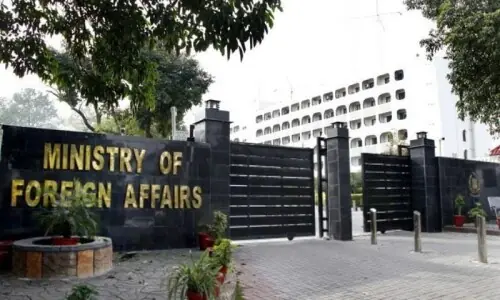GORGING on a three-egg omelet he loves but won’t get on his Delhi-Newark flight, Mukul Vaingankar casually lets me know of his escape from the botched but bloody 1986 Pan Am hijacking in Karachi. It may all be part of flippant memory for him today but it was traumatic and horribly scary when he went through it 28 years ago on the morning of Sept 5, which was his birthday.
The 54-year old culturally rooted Saraswat Brahmin from Mumbai is a devotee of Indian classical music and lives with his family — percussionists, singers, lawyers — in California. He also happens to be a relative, visiting Delhi to see his terminally ill uncle. I’ll come to Mukul’s first row account of the terrifying incident in a moment. It left 20 people killed, including Pakistanis, Indians and Americans, and several others shot, or injured while escaping the four well-armed but nervously fidgety gunmen who took control of the 747 Jumbo at Karachi airport’s tarmac.
During the three or four days he spent in the city Mukul acquired deep affection for Karachi, its Edhi Foundation and its caring, selfless doctors. However, a broad-brush view of the political context in 1986 could help us locate the distance we have travelled through the turbulent decades with their sharp ideological bends and political U-turns culminating in the brazen terror attack on the same airport a few weeks ago, albeit with a contrary purpose this time.
The issue for the Arabic-speaking Pan Am hijackers was the liberation of Palestine from Israel’s occupation.
At some point after a nearly 10-hour terror vigil, the power grid on the plane collapsed and the lights went off.
Those who have watched the Middle East for the last three decades or more would know how that objective has become a distant dream with chances of an equitable and just fulfilment for the region’s Jews and Arabs looking more remote than ever before. By contrast the recent attack on Karachi’s Jinnah Airport had pretty much an opposite purpose. In fact, the outrage mirrored what could be a string of choreographed events in Baghdad, Tripoli and Damascus whereby self-styled Muslim puritans are targeting those who had assiduously supported the idea of a free and multicultural Palestine.
At several levels, the intra-Muslim bloodshed dominating the political firmament of the Middle East and swathes of South Asia today, seems to have its genesis in the disastrous 1981 Fez summit of the Arab League. Saudi Arabia’s Fahd Plan, which effectively proposed to recognise Israel and promised it security in return for what major Arab leaders saw as a moth-eaten Palestinian state with municipal rights, was rejected by Iraq, Syria and Libya. Look closely, and you would find the three countries that steadfastly opposed the Fahd Plan are the ones confronting an existential challenge, their secular and tyrannical rulers being sought to be replaced by rabid and tyrannical rulers who largely share Riyadh’s political allergies, if not its worldview.
I didn’t ask Mukul Vaingankar if he had a preference between Israel and Palestine when he was seated on the window seat right in the front row of the economy class cabin while disaster prepared to strike the plane. Nor does he evidently have a view now. What was evident from his narrative though was that ordinary Indians and Pakistanis have a subtle bonding that endures, albeit undetected largely because it is their governments mostly that are handling or mishandling each other.
When the Arab gunmen stormed the plane dressed as airport security personnel, an alert member of the cabin crew was able to transmit the message to the pilots. The pilots fled through the cockpit windows perhaps as part of a drill to deny the hijackers leverage to use the plane’s communications and to immobilise its flying ability. A total of some 360 passengers were rounded up from different cabins and herded into the area where Vaingankar unwittingly found himself in the crosshairs of the Abu Nidal gang. His two neighbours were Gujarati-speaking women from a dance troupe on its way to perform in New York.
At some point at night after a nearly 10-hour terror vigil, the power grid on the plane collapsed and the lights went off. The gunmen who were parked right near Vaingankar’s row began shooting randomly in the dark, but they spared the seats to their left and right possibly as it would have required them to turn and risk losing their bearings in the invisible commotion.
A military assault followed and a chute was lowered for the surviving passengers to escape. Vaingankar could have walked off to the safety of the airport terminal as several other passengers had done. He was, however, persuaded by a Gujarati woman with a fractured foot to escort her in one of the Edhi ambulances that were headed for the Jinnah Hospital. He briefly became her interpreter.
“The Pakistani doctors were angels. One of them gave me his stethoscope so that I could walk about freely looking for a handy phone,” he recalled, explaining that security was tightened after one of the suspected hijackers was brought wounded to the hospital. The phone lines were jammed with anxious callers. A helpful lady doctor escorted him to the radiology department where Vaingankar found a phone that had been spared the melee. By then he had collected as many addresses as he could of patients from Bombay. “As I gave my father the last contact, the line went dead.”
Mukul Vaingankar has nothing but unalloyed respect for the Pakistanis he engaged with. He feels strongly that it is a particularly South Asian syndrome — the instant warmth and readiness to help each other unselfishly in a crisis. He was pained by the turn of events in Pakistan since his 1986 ordeal. He knows that the good doctors he met and the caregivers of the Edhi Foundation he befriended are in trouble today at the hands of those that attacked the Karachi airport recently. Mukul Vaingankar wants to help, but like many others, he doesn’t know where to begin.
The writer is Dawn’s correspondent in Delhi.
Published in Dawn, July 1st, 2014































